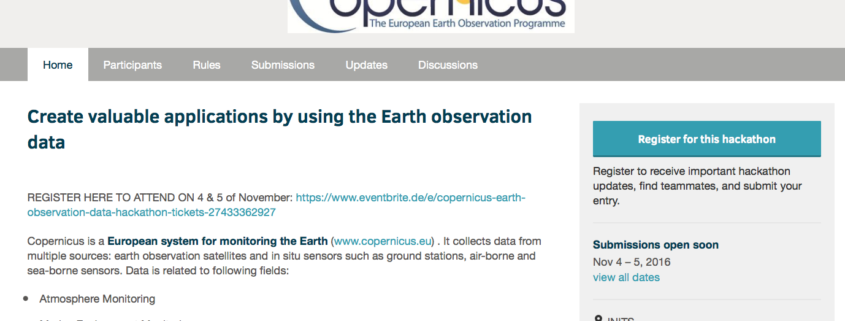EODC successfully hosted Copernicus Hackathon
EODC successfully hosted Copernicus Hackathon
On November 4 and 5, the first “Open Data Copernicus Hackathon” took place in Vienna on the premises of the University Business Incubator INiTS. In the two-day event initiated by the Federal Ministry of Transport, Innovation and Technology (BMVIT) and the Austrian Research Promotion Agency (FFG), developers, data specialists and scientists from various disciplines met in project teams to create pioneering applications from satellite data. From nine international project teams, literally working around the clock to come up with creative ideas and solutions, two exciting initiatives emerged as winners: One project highlighted the general availability of satellite data; the second project tackled the problem of “land grabbing”.
Data from the Sentinel-1 and Sentinel-2 missions, within the framework of the European Space Agency’s (ESA) and European Commission’s Copernicus initiative, were provided by the Earth Observation Data Center (EODC). Data were sighted, evaluated and prepared in concrete cases by the participating teams from all over Europe. Representatives of the European Space Agency (ESA), various Austrian university institutes and the Austrian Research Promotion Agency (FFG) were involved in helping participants to use the vast amounts of data and turn them into value for humanitarian purposes.
Amongst others, the following applications were developed during the hackathon:
– Monitoring the bark beetle in forests in order to reduce economic loss
– Maps for early warning and monitoring of floods in harmonisation with existing public government data
– Localization of the most suitable habitats for bees for the purpose of reducing bee mortality
– Measurement of solar radiation in cities to prevent overheating of exposed buildings and city districts
Two teams emerged as winners of the first Copernicus Open Data Hackaton, which was also supported by the mobile telecommunication operator Drei with technical infrastructure. On the one hand, the project “Copernicus to the people” by the team “kopf.io”, which aims to make available all relevant Copernicus data to the general public through a website in a way that no prior technical knowledge is necessary. This supports the idea of democratizing knowledge and Open Data. Second winner is the project “sharecropper” by the team “CROPernicus”, which uses an app to map changes from arable land and link them with other Open Data like ownership information. With this method, illegally cultivated or illegally used land can be recorded and countermeasures can be performed.
The winning teams were awarded support with an INITS business incubation program and with access to EODC compute and long term archive infrastructure. In order to craft their ideas into real business applications, EODC will enable access to the Sentinel mission archives and will provide support with virtual development environmenta and cloud-based web applications for processing large volumes of data, an initiative which has been supported also by the Vienna Business Agency. The winning team solutions will also be featured on the 23° broker website (https://www.23degree.org/) and presented at the 25th Open Government Platform Vienna in December (https://open.wien.gv.at/site/kalender/?cid=all&mc_id=138).
Further links:
– Hackathon webpage: https://copernicus.devpost.com/
– Photos and links of the event by INITS: https://drive.google.com/drive/folders/0B-PuTsrTsveEWEQ3T0RiTmVmeTA



